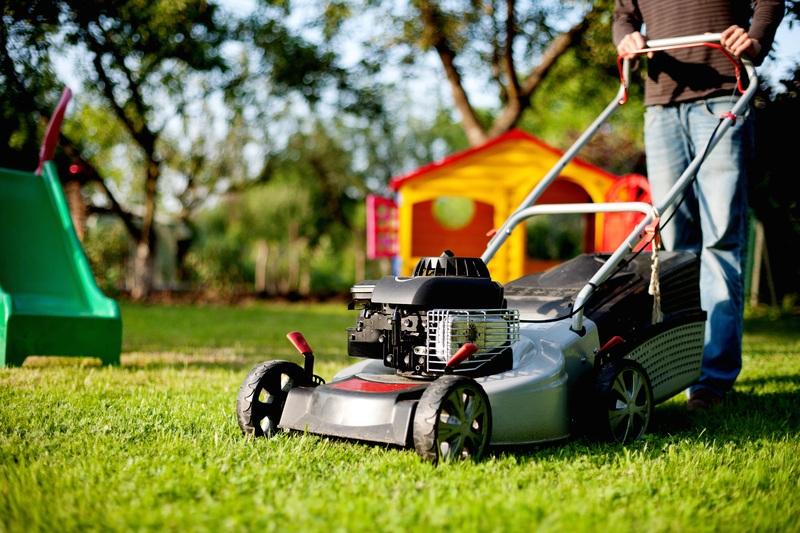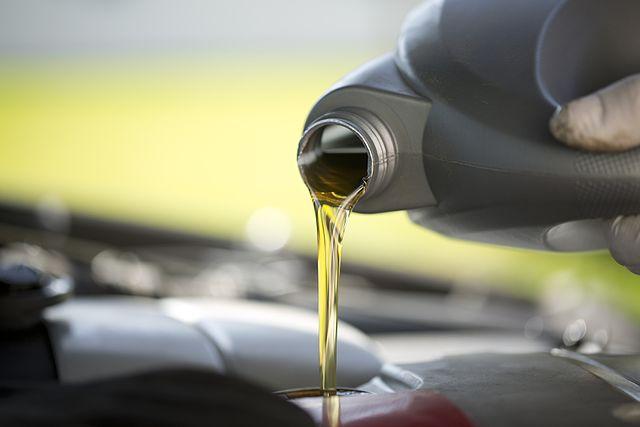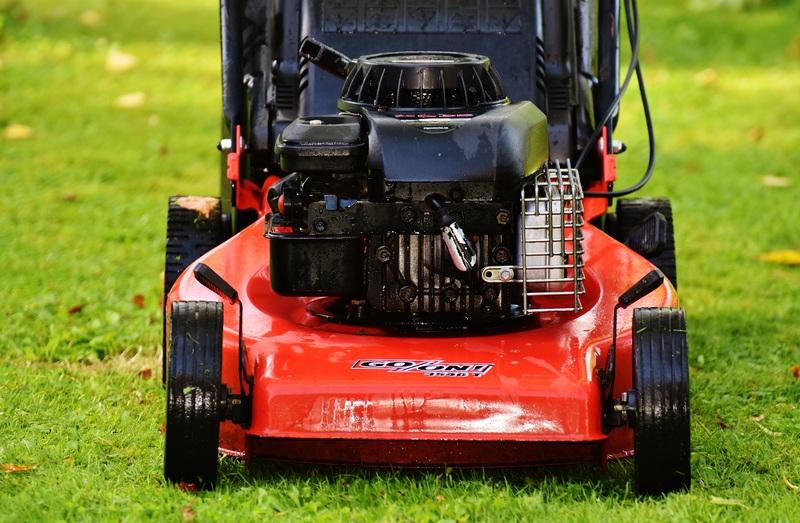When it comes to maintaining the health and beauty of your lawn, having the appropriate gardening tools at your disposal can make a significant difference. One of such tools is the lawn mower. Lawn mowers deliver professional results when it comes to cutting your grass. In addition, they make it possible for you to cut the grass in a short time, which ensures that you will have more time for other tasks and projects. If your lawn mower white smoke then dies, read this article!

A lawn mower usually blows out white smoke because oil has spilled onto the engine.
However, just like any machine, lawn mowers sometimes can also malfunction. For instance, it is common for lawn mowers to blow out white smoke before they suddenly stop working. And, when it occurs during the peak mowing season, it can be quite frustrating.
However, do not worry! It might just mean that there was an oil spill on the engine, which is an easy problem to fix. Having said that, in some cases, your lawn mower might also blow out black or blue smoke, indicating different issues.
So, if your lawn mower is blowing smoke and suddenly shutting down, keep reading! We will discuss the causes of white smoke in lawn mowers & what you can do to fix it.
White Smoke Is Not Always A Serious Issue!

White-colored smoke is a common issue and usually goes away on its own.
The emission of a small amount of white smoke from a lawnmower is a common occurrence. However, white smoke from a lawn mower is not always a serious issue. In most cases, this indicates that the gas feed jet has become blocked.
If you have been using a lawn mower for a few years, there is a big chance that you might have encountered this situation at least once. White smoke from your mower may look like a serious problem, but the solution is simple in most cases.
There are a lot of different things that could be causing your lawn mower to blow out white smoke and shut down. Once you completely understand all of these factors, it will be much easier for you to take the necessary measures.
Following are some reasons why a lawn mower will typically emit white smoke:
- Cylinder and/or rings are worn
- Damaged piston rings or cylinder
- Engine overfilled it with oil
- The engine that has completely worn out
- Moisture build-up in the tank
- Mower tipped over incorrectly
- The breather tube is obstructed
- There is an air leak in the crankcase
- Using oil grades that are not suitable
Fortunately, in most cases, figuring out and resolving issues of this nature does not require a specialist’s assistance. For further information, check the manual that came with your lawn mower. If you don’t have the manual itself, you can typically find it and download it from the manufacturer’s website by searching the name and model number of your mower plus the word “manual.”
RELATED: Help! I Put Gas In The Oil Tank Of My Lawn Mower | How To Fix It Fast?
Troubleshooting A Lawn Mower For White Smoke

One of the most common causes of white smoke is a mower cutting grass at steep angles.
Before we move on towards discussing the causes of white smoke in lawn mowers, let’s just quickly go over a quick troubleshooting guide. It will help you pinpoint the exact reason behind a malfunctioning lawn mower and save you a lot of time.
- Check the air filter first, and change it if it’s unclean.
- Check the oil level next. Then, if necessary, fill with the right grade of oil.
- Mowing at steep angles for an extended time can also result in smoke due to oil leaks. So, make sure caps are fully tightened.
- To burn out any oil that could have gotten into the engine, start the mower and let it run for 10 to 15 minutes.
Now, let’s move on to have a more in-depth conversation about each of the issues. I will also describe the steps and measures that need to be taken in order to solve such problems and avoid them from occurring in the future.
Moisture Build-Up in the Tank

Excessive condensation in the gas tank can cause your mower to produce white smoke.
When it comes to the lawn mower, it is not a good sign that there is water in either the fuel line or the fuel tank. It always has the potential to cause engine problems. When the water has invaded the cylinder, it won’t be easy to light the cylinder. Additionally, it prevents the fuel from being ignited in the correct manner. In most cases, an excessive amount of condensation is the source of the water.
You can place the responsibility for this on the environmental factors. But, there are also times when a wobbly gas cap could cause it. You must empty the tank and fill it with new, untainted fuel to get rid of the water. And, it goes without saying that you must remember to get rid of the gas and oil you removed from the tank earlier in the process.
RELATED: Starting A Lawn Mower That Has Been Sitting For Years | A Complete Guide
Engine Overfilled It With Oil

One of the most frequent causes of white smoke in lawn mowers is adding too much engine oil.
Even though you may believe that excess oil will simply be burned off, excessive oil can cause serious damage to the engine of your lawn mower. This is because the vast majority of engines use splash lubrication systems. Therefore, if you use an excessive amount of oil, the level of the oil will end up being higher than the splash paddle.
When this occurs, you will have issues such as white smoke. Putting in an excessive amount of oil is one of the most common reasons for white smoke, so when changing the oil in your mower, make sure that you only put in the required amount. It’s a waste of resources and won’t do your machine any good.
The solution is to let the engine cruise at a low speed while you drain the excess oil and wait for the smoke to clear. This could take up to five minutes of your time. Read the owner’s manual of your mower on a semi-regular basis to refresh how much engine oil you need to put in your lawn mower. In most circumstances, the engine oil requirement for your lawnmower should not exceed 20 ounces.
However, make sure that you use the exact quantity. After the engine has been lubricated with oil, use a dipstick to find out the level of oil in the engine and ensure that it is within the recommended range. If there is any indication of an overfill, remove any excess oil.
RELATED: How To Fix Lawn Mower Sputtering: Common Reasons & Easy Fixes!
Lawn Mower Tipped Over

Tilting the mower will cause oil to move from the crankcase to the cylinder, where it burns & produces smoke.
Is the angle at which your lawn mower is tipped greater than 15 degrees when you mow your lawn? Maybe it is possible that you stored it in that manner or that you accidentally tipped it over. However, the vast majority of people get themselves into this situation when they are cleaning under the deck or even when they are emptying the chute.
With any lawn mower, you should avoid mowing on any surface with a slope of more than 15 degrees unless the mower is specifically designed to cut on steep heels. In addition, if performing maintenance on the mower requires you to tip it over, you should do so with the carburetor, and air filter positioned so that they are facing upwards.
Nevertheless, when people accidentally topple their mower, the oil moves from the crankcase to the cylinder, and your lawnmower begins to smoke as soon as you start cutting again. In certain instances, the oil will leak as well. The easiest way to fix this issue is to let the engine keep running until all of the oil that has made its way into the cylinder has been burnt. It is also important that you consult the user manual of your mower.
It will tell you exactly how to overturn the mower for cleaning and repairs and whether it is possible to use a particular mower on a steep area.
Head Gasket Failure

Head gasket failure leads to a malfunctioning engine which causes the production of white smoke.
It is much less likely that the head gasket will fail, but if it does, it will produce a lot of smoke. In contrast to the problems discussed previously, this one requires slightly more effort. A head gasket is made of metal and graphite.
In an engine, it is installed in the space between the cylinder head and cylinder block. It is responsible for preventing leaks in the combustion chamber. If the head gasket fails, you may experience other symptoms, such as an odd noise, oil leaks, increased pressure within the crankcase, and smoke.
Head gasket failure leads to a malfunctioning engine seal, and some pressure will inevitably be lost from the cylinder. In addition, even a very small hole in the head gasket can allow the oil to seep into the cylinder that separates the combustion chamber and the engine. The solution is to get a new head gasket installed.
However, if you discover that you have worn piston rings or rings that have failed, you will most likely need a new engine. A brand-new engine is almost always the more affordable option and comes with a warranty.
Gas In The Oil

If your engine emits blue or white smoke, it is likely that t is burning oil with gas.
If your lawn mower is emitting white smoke, you may have mistakenly put oil into the gas tank. Unfortunately, this is a problem that arises quite frequently. If you made this mistake and need to fix it, empty the gas tank and fill it with fresh gas. If you want things to go more smoothly, you can use a siphon or a fluid extractor.
However, you should not start the engine if the oil has a smell similar to that of gas. This indicates that the seal on your carburetor has been broken. In this particular scenario, you should first make the necessary adjustments to the carburetor and swap out the machine’s oil before attempting to use it again.
If you try to run the engine without adding the appropriate amount of oil or fixing the problem, you could end up causing damage to the engine since the oil will be too thin because of the mixed fuel. After removing the contaminated fuel, continue operating the mower’s engine until it stops working due to the lack of fuel.
This ought to clean the gas out of the system so you can put in new gas. If the engine will not start despite your best efforts, the carburetor most likely needs to be cleaned.
Damaged Piston Rings
Several different factors can lead to the piston rings becoming damaged. However, the worn-out or dirty air filter is the most common cause of this problem. This problem is pretty much unavoidable if you don’t perform proper and regular maintenance on your mower. Due to dirty air or worn-out air filters, dust and other minute particles can enter the combustion chamber, which could cause severe damage to the piston rings.
Since piston rings regulate the amount of engine oil and drain any surplus oil from the combustion chamber, if you have damaged piston rings, it will not be possible to prevent oil from getting into the combustion chamber. Having bad piston rings is bad news because you cannot fix them unless you are a professional.
And damaged piston rings indicate a cylinder problem as well. So, it becomes necessary to completely rebuild the engine in order to repair the piston rings. However, if you’re determined to fix it, take it to a professional repair shop.
Nonetheless, purchasing an entirely new engine would be the most sensible choice in such a situation where piston rings have been damaged.
Final Thoughts
Remember that brand-new lawn mowers tend to produce white smoke for a short time until they get going and adjust to everything. So don’t freak out if you see this on the first mow you make with your brand-new mower; it’s perfectly normal.
However, on the other hand, if you see white smoke coming from an old lawn mower before it shuts down, the most likely causes are what I mentioned above. The appearance of white smoke is often alarming, but the problem can often be easily resolved with little effort. Blue or black smoke is much more hazardous to your lawnmower than white smoke.
With white smoke, it’s simply a matter of resolving a minor issue and running the engine until the smoke disappears. However, if you cannot determine the problem, consult an expert.
Frequently Asked Questions
Can you run a lawnmower with a blown head gasket?
Your lawn mower will not be able to operate at full power if the seals on the head gasket or the head of the gasket have blown out. In addition, a blown head gasket can be quite pricey to fix if it is not replaced on time. So, you should get it fixed as quickly as you can.
How do I know if my lawn mower has a blown head gasket?
You have a bad gasket if the mower is stalling out or won’t start when you know of the oil leak. Also, if the mower cuts out when you turn a corner, but there is no oil leak, the gasket may still be damaged because there is insufficient pressure to maintain combustion.
What does it mean when a lawn mower blows white smoke?
White smoke is often caused by a blown head gasket, incorrect oil grades, air leaks or worn piston rings and cylinders. However, a tilted engine is the most common reason for white smoke blowing out of your lawnmower. No lawnmower should be tilted at an angle greater than 15 unless it is specifically designed to do so.
Will too much oil cause white smoke?
Yes! White smoke can be caused by too much oil. However, the oil getting into the combustion chamber is the issue here, not the oil itself. When oil levels are excessively high, it spills into the combustion chamber and burns with the fuel and air, emitting smoke.
Why does my lawn mower die after running for a few seconds?
Your lawn mower may be unable to keep running if the spark plug is damaged or unclean. If the plug is clogged with dirt and grease, the mower may be able to produce the initial spark. However, the spark won’t be sufficient to keep the engine going.
Sources for Further Reading
Lawn Mower Care and Safety – University of Florida Extension Service
Mowers and mowing safety – University of Minnesota Extension Service
Lawn mower tune-up – University of Delaware Extension Service
Editor’s Recommendations
Dallisgrass Vs. Crabgrass: Differences & How To Control Them | A Comprehensive Guide
Grass Spiders: How To Get Rid Of Them? A Comprehensive Guide







